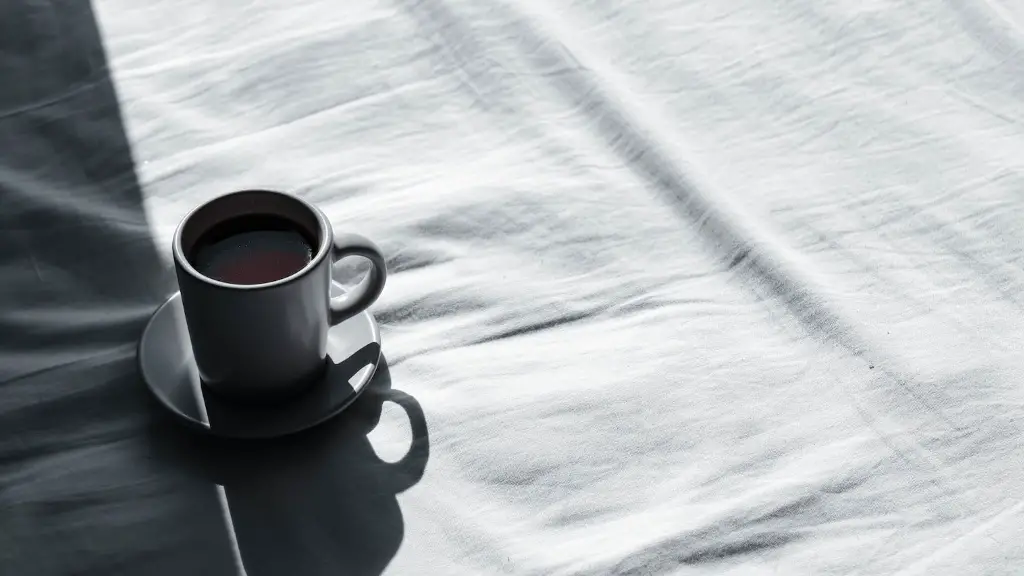Caffeine and Sleep Interference
Caffeine is a widely available stimulant that many of us use to stay energized and alert, especially in the morning. It’s understandable that many of us need a cup of coffee to get going in the mornings, but this can actually have an impact on our sleep cycles. Caffeine has the ability to affect our sleep duration and quality, as it can stop us from drifting off to sleep.
It takes an average of fifteen to twenty minutes for the effects of caffeine to kick in, with the majority of people feeling the effects within the first hour of consumption. It can stay in your body for up to six hours, depending on the individual’s metabolism and weight. Therefore, if you drink coffee in the morning, it could interfere with your sleep even around bedtime.
How Caffeine Disrupts Sleep
Caffeine keeps us alert and maintains our energy levels by blocking adenosine – a natural factor that causes fatigue. Adenosine helps regulate your circadian rhythm and the release of hormones. Caffeine works by blocking the effects of adenosine, preventing us from feeling tired and instead, feeling energized. This opposite result of what your body would normally do, provides a jolt of energy, but it also makes it harder to wind down and sleep.
In addition to preventing us from feeling tired, caffeine also delays the start of REM (Rapid Eye Movement) sleep, which is the deep and restful phase of sleep. People that have caffeine-induced insomnia can be put off entering REM sleep entirely, depriving them of valuable restorative rest.
How Much Caffeine is Too Much?
It is difficult to establish the amount of caffeine everyone can handle before it affects their sleep cycle, as it varies from person to person. Generally, experts recommend that a cup or two of coffee could provide enough stimulation without having an effect on sleep quality. It’s important to note that other beverages and food also contain caffeine, such as energy drinks, soda and chocolate.
Consuming small amounts of caffeine before bed is fine, but if you find yourself unable to sleep or cannot fall asleep after drinking coffee, then you may be consuming too much. If your caffeine intake is causing you to stay awake, it is recommended that you replace it with caffeine-free beverages.
Increasing Caffeine Intake Over Time
Some people can become accustomed to caffeine after a period of regular consumption, meaning we require more and more caffeine to feel alert. This means we can adjust to the effects of caffeine more easily and become tolerant to it. This can lead to us consuming larger amounts of caffeine, as we need it to stay alert and focused.
The recommended daily intake of caffeine for adults is 400mg per day. For those that are pregnant and breastfeeding, an intake of 200mg is advised. A regular cup of coffee consists of around 100mg of caffeine, so it is important to keep an eye on our consumption, to ensure we’re not exceeding the recommended daily intake.
Tips For Reducing Caffeine Intake
1. Drink black or green tea instead of coffee – both provide a smaller, yet sufficient amount of caffeine
2. Try switching to decaf coffee
3. Avoid energy drinks as they contain high amounts of caffeine
4. Avoid consuming caffeine after 2 pm
5. Make sure to track your caffeine intake – write down what and when you consume caffeine
6. Try consuming caffeine earlier in the day
7. Try drinking caffeine-free herbal teas or warm milk before bed
8. Exercise in the morning – physical activity provides natural energy
How to Sleep Better After Drinking Coffee
1. Avoid taking naps – Though it might seem like a good idea to counteract the caffeine effects, doing so can disrupt your sleep-wake cycle.
2. Increase your intake of natural sleep aids – this can include foods like kale, spinach, cashews and chamomile tea.
3. Stick to a sleep-wake routine – This means going to bed and waking up at the same time every day.
4. Try a hot bath – Before bed, take a relaxing bath in warm or hot water. This will help you wind down and prepare for sleep.
5. Use relaxation techniques – This can include deep breathing exercises, mindful meditation, or progressive muscle relaxation to reduce tension in the body.
6. Try aromatherapy – Aromatherapy can help reduce stress and tension, which can be beneficial for those having difficulty sleeping due to caffeine.
7. Listen to relaxing music – Listening to calming music at bedtime can also help you relax and take your mind off the effects of caffeine.
8. Use light to your advantage – Darkness increases your production of the sleep hormone melatonin, while exposure to light can help your body adjust its internal clock.
Changes to Lifestyle and Habits
Though it may be difficult to completely cut out caffeine, it is possible to make changes to our lifestyle and habits to reduce our caffeine intake and get a better night’s sleep.
Firstly, reducing our caffeine intake after a certain time of the day can make all the difference. A good rule of thumb is to avoid drinking or eating anything with caffeine after 2 pm. This will give you the maximum amount of time for the caffeine to leave your system. Additionally, avoiding too-large doses of caffeine can also help reduce the severity of your symptoms.
Another helpful tip for those struggling to sleep after drinking coffee is leading an overall healthier lifestyle. Exercise can be beneficial for both your mind and body, enabling you to relax and sleep better. Eating healthy and nutritious foods, such as vegetables and fruits, can also help improve your sleep.
Adverse Psychological Effects
It is important to remember that caffeine does more than just prevent us from sleeping; it can also give us a psychological boost. It can improve our alertness, concentration, and energy levels. But to get the full benefits of caffeine, it must be used in moderation.
Excessive caffeine intake can lead to anxiety, irritability, and restlessness, as well as headaches, nausea, and heart palpitations. It is important to be aware of how caffeine is affecting us and how much we are consuming.
Changing Your Caffeine Mindset
At times, caffeine can be very helpful in keeping us alert and focused. However, it can be very easy to get into a habit of drinking too much of it, and this can have a negative effect on our overall wellbeing.
It is important to understand why we are drinking coffee and how much of it we actually need. Setting limits for ourselves is a good way to start, and try to spread out consumption throughout the day instead of drinking it all at once.
Knowing your tolerance for caffeine, and being mindful of when and how much you consume can be beneficial for both our sleep quality, and our overall health.
Lifestyle Changes for Better Sleep
1. Establish a good sleep schedule and stick to it – going to bed and waking up at the same time every day
2. Exercise regularly – physical activity has the ability to enhance sleep
3. Avoid consuming caffeine late in the day – cutting down on caffeine consumption can help you sleep better
4. Avoid taking naps and limit day time sleep – naps can disrupt your circadian rhythm
5. Avoid drinking large amounts of liquids before bed
6. Listen to calming music – this can help relax your mind and body before bed
7. Limit screen time – exposure to blue light from laptop, TV and phone screens can disrupt sleep
8. Take warm baths – a warm bath helps reduce stress and release tension.


